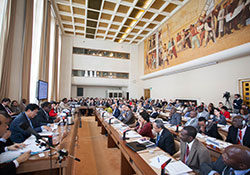World Health Assembly, day 3: progress on health-related Millennium Development Goals and Global Fund’s new funding model

WHO/Pierre Albouy
At a technical briefing on 22 May 2013, Dr Margaret Chan, WHO Director-General, applauded the contribution made by the Global Fund to Fight AIDS, Tuberculosis and Malaria (GFATM) to turning back the epidemic of these diseases.
The briefing was organized to introduce a new funding model developed by the Fund. This model is intended to prioritize action to accelerate reaching the Millennium Development Goal (MDG) targets. Dr Mark Dybul, Executive Director of the Global Fund, explained that the new approach builds on three core principles:
- working as a financing institution that partners with others to serve countries;
- providing predictability around the availability of resources; and
- creating a platform to address these diseases through national health systems.
The changes to how the Fund operates were warmly welcomed, and the support provided by WHO and other technical partners commended. Speakers also praised the Fund’s closer alignment with country plans and willingness to provide more support for health systems, as well as its readiness to learn from experience and to increase transparency.
Highlights for the European Region
GFATM
During discussions on the GFATM’s new funding model, the delegation of Sweden emphasized the need for the efficient use of resources and for international partnerships to achieve results, as well as asking for clarification from the Global Fund on their expectations.
The delegation called for:
- national strategies and priorities to be used as a starting point;
- transparency, especially about available funding;
- existing financial management systems to be used;
- efficiency in procurement, especially planning and forecasting;
- realistic monitoring and evaluation requirements; and
- an appropriate balance and support for partnerships.
Health in the post-2015 development agenda
Together with Botswana, Sweden also organized a side event on health in the post-2015 development agenda. Sweden emphasized that the health-related MDGs had been a success, and that they should remain priorities in the future, together with new priorities including addressing noncommunicable diseases, demographic changes and new health threats, equity, stronger health systems, and greater focus on specific issues such as sexual and reproductive health and rights, nutrition, mental health and adolescent health. The delegation saw health in a broader developmental role in the future, as both a contributor and beneficiary of development as well as a human right.
In plenary, the delegation of the Republic of Moldova praised the MDGs as a good framework for action and pointed out the value of continuing to refer to them, while striving for efficiency under the burden of the current financial crisis. The delegation emphasized the need for innovation and empowerment to meet the health needs of their population.
The delegation of Lithuania recognized the importance of the MDGs for their contribution to specific areas such as reducing maternal and child mortality. They nevertheless also highlighted unfinished MDG agendas in areas such as tuberculosis, which remains a problem in Lithuania. They went on to mention the importance of tackling noncommunicable diseases and express their conviction that WHO leadership will play a central role in addressing health inequalities in the future.
Mental health action plan 2013–2020
Committee A commented on the draft comprehensive mental health action plan 2013–2020. Members were generally supportive and appreciative of the inclusive process, vision, principles and strategic direction. Concerns were voiced about certain targets, especially those for suicide, given the surveillance difficulties and lack of human and financial resources.
Norway, on behalf of the Nordic countries, called for a multisectoral approach to focus on promotion, prevention and treatment. It also pointed out a need to complement surveillance information with information on well-being.
The action plan will be revised according to Member States’ comments.



